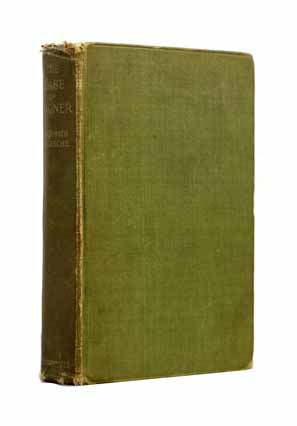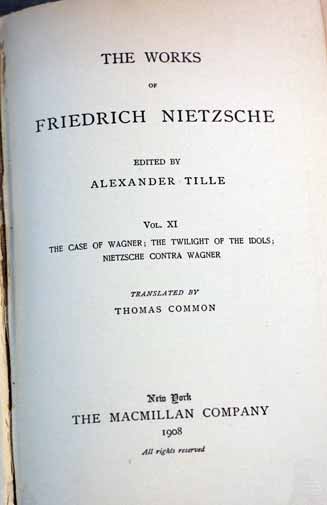About the book (from wikipedia):
“Twilight of the Idols“, or, How to Philosophize with a Hammer (German: Götzen-Dämmerung, oder, Wie man mit dem Hammer philosophirt) is a book by Friedrich Nietzsche, written in 1888, and published in 1889.
Nietzsche criticizes German culture of the day as unsophisticated and nihilistic, and shoots some disapproving arrows at key French, British, and Italian cultural figures who represent similar tendencies. In contrast to all these alleged representatives of cultural “decadence”, Nietzsche applauds Caesar, Napoleon, Goethe, Thucydides and the Sophists as healthier and stronger types. The book states the transvaluation of all values as Nietzsche’s final and most important project, and gives a view of antiquity wherein the Romans for once take precedence over the ancient Greeks.
The reference to the “Antichrist” is not intended to refer to the biblical Antichrist but is rather an attack on the “slave morality” and apathy of Western Christianity. Nietzsche’s basic claim is that Christianity (as he saw it in the West) is a poisoner of western culture and perversion of the words of and practice of Jesus. In this light, the provocative title is mainly expressing Nietzsche’s animus toward Christianity, as such. In this book, Nietzsche is very critical of institutionalized religion and its priest class, from which he himself was descended. The majority of the book is a systematic, logical and detailed attack upon the interpretations of Christ’s words by St. Paul and those who followed him.
“Nietzsche contra Wagner” is a critical essay by Friedrich Nietzsche, composed of recycled passages from his past works. It was written in his last year of lucidity (1888–1889), but was not published until 1895, six years after his mental collapse. Nietzsche describes in this short work why he parted ways with his one-time idol and friend, Richard Wagner. Nietzsche attacks Wagner’s views, expressing disappointment and frustration in Wagner’s life choices (such as his conversion to Christianity, perceived as a sign of weakness). Nietzsche evaluates Wagner’s philosophy on tonality, music and art; he admires Wagner’s power to emote and express himself, but largely disdains what Nietzsche calls his religious biases.
“The Case of Wagner” is a critique of Richard Wagner and the announcement of Nietzsche’s rupture with the German artist, who had involved himself too much, in Nietzsche’s eyes, in the Völkisch movement and antisemitism. His music is no longer represented as a possible “philosophical affect,” and Wagner is ironically compared to Georges Bizet. However, Nietzsche presents Wagner as only a particular symptom of a broader “disease” that is affecting Europe: that is, nihilism. The book shows Nietzsche as a capable music-critic, and provides the setting for some of his further reflections on the nature of art and its relationship to the future health of humanity.



